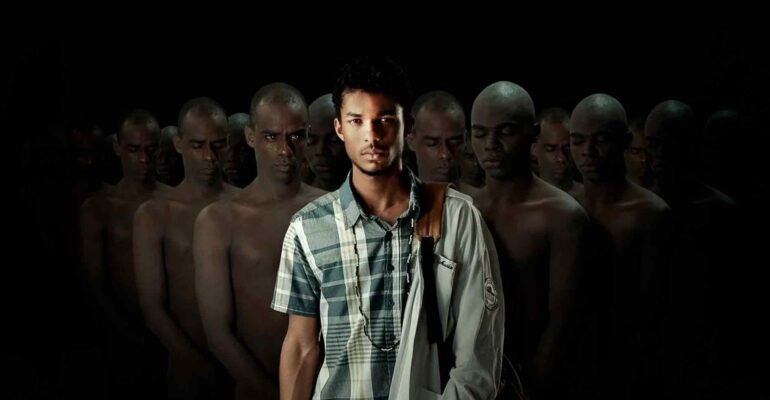M8: When Death Rescues Life – A Powerful Reflection on Racism in Brazil
M8: When Death Rescues Life – A Powerful Reflection on Racism in Brazil
M8: When Death Rescues Life (2019) is a Brazilian film directed by Jeferson De, with a screenplay co-written by De, Cristiane Arenas, Iafa Britz, Carolina Castro, Paulo Lins, and Felipe Sholl. The movie blends drama, suspense, and mystery, incorporating subtle elements of horror. However, rather than relying on predictable genre tropes, M8 takes an unconventional approach. The film consciously avoids excessive jump scares and graphic horror, instead using silence and simplicity to create an unsettling atmosphere.
The Story Behind M8
The film follows Maurício (played by Juan Paiva), a young Black student entering medical school. As he begins his anatomy classes, he faces two striking realities: he is one of the few Black students in a predominantly white environment, and the only other Black individuals in the classroom are the cadavers used for study.
When Maurício encounters the body labeled “M8” (played by Raphael Logam), he is confronted with deep, disturbing questions. His experience is further intensified when a fellow student mistakenly assumes he is a university employee—a clear display of structural racism. The presence of only Black cadavers highlights an even graver reality: systemic violence against Brazil’s Black population.
M8 as a Reflection of Brazilian Society
Through Maurício’s journey, M8 sheds light on crucial social issues, including the 2018 GLO (Law and Order Guarantee) military intervention in Rio de Janeiro, the anguish of families searching for missing loved ones, and police violence. The film also makes a compelling choice by connecting Maurício and M8 through an Afro-Brazilian religion—an important detail, as African-derived spiritual practices in Brazil are frequently demonized and subjected to both symbolic and physical attacks.
Psychological Horror and Social Critique
While M8 could have been a straightforward drama, it leans into psychological horror. Maurício’s encounters with M8’s spirit push him to uncover the unknown man’s identity, history, and humanity. This psychological tension reaches its peak when Maurício himself experiences police brutality. Without the intervention of his classmates, he might have become yet another nameless victim—an “M9” in the making.
A Stellar Cast and Notable Performances
M8 boasts an exceptional cast, balancing young talent and seasoned actors. Alongside Juan Paiva, standout performances include Bruno Peixoto (Domingos), Giulia Gayoso (Suzana), Mariana Nunes (Cida), and Fábio Beltrão (Gustavo). The film’s older generation is represented by powerful performances from Aílton Graça, Alan Rocha, Zezé Motta (Ilza), Léa Garcia (Dona Ângela), and Pietro Mário (Salomão). One disappointment, however, is the minimal screen time given to Lázaro Ramos, who appears only briefly as a funeral driver.
The Dehumanization of Black Bodies
M8 is just a label, a simple identification code for a cadaver in a medical school. But behind that body lies a life, a story. In a country where structural racism remains deeply ingrained, unidentified Black bodies often become mere numbers—anonymous figures in laboratories, morgues, and statistics. The film serves as a stark reminder of this reality.
The Brutal Reality Behind the Film
Data from the Institute for Applied Economic Research (IPEA) report Lost Lives and Racism in Brazil highlights the racial disparities in violence. According to Brazil’s 2010 Census, the homicide rate for Black individuals was 36 per 100,000, compared to 15.2 per 100,000 for non-Black individuals. In a nation of extreme social contrasts, Black people are disproportionately affected by violent deaths.
The song A Carne by Elza Soares powerfully encapsulates this tragic reality with the haunting lyric: “A carne mais barata do mercado é a carne negra” (“The cheapest meat on the market is Black meat”). This metaphor underscores an unsettling truth: in a capitalist and deeply unequal society, Black lives are the most devalued.
M8 – A Must-Watch Film with a Crucial Message
M8: When Death Rescues Life is more than just a movie—it is a social critique, a call to reflection, and a necessary conversation about racial injustice in Brazil. By weaving psychological horror with a powerful narrative on systemic racism, the film delivers a compelling and unforgettable experience that challenges its audience to confront uncomfortable truths.
Did you watch this film? Would you like to discuss it and learn Portuguese at the same time? Join The Movie Club, where we explore films, documentaries, and series from a cultural perspective. Every month, we dive deep into new content, always focusing on cultural insights and language learning. Don’t miss out—be part of the conversation! Join here
Want to read this article in Portuguese? Click here



















